The Apple iPad Pro Review
by Ryan Smith, Joshua Ho & Brandon Chester on January 22, 2016 8:10 AM ESTBattery Life
Battery life is important beyond any doubt. No one wants a tablet or phone that can only spend three hours away from a charger before it dies, no matter how good the device is. While such battery life might be incredible for a desktop replacement or anything else that realistically spends most of its life plugged into a charger, mobile devices are usually carried on the go and used far away from a charger for significant amounts of time. Probably the ultimate example of this is travel, where one might use a tablet to watch movies and browse the internet for a few hours over the course of a flight.
As a result, a significant portion of our reviewing efforts are devoted to determining battery life. In order to quantify battery life, there are inevitably a lot of test cases to cover. Some people might spend most of their time in an e-reader app, others might spend most of their time playing games or similarly intensive tasks on their phones. There’s no real standard for usage, so a tablet that might last a day for one person could last a week. As a result, the goal of our testing is to provide a useful relative comparison. In order to do this, we attempt to equalize for variables like display brightness by setting all displays to 200 nits for battery life testing. Due to the inability to completely eliminate the variables that come with live network testing, we also use strong network reception with high throughput on LTE to ensure that things like power amplifiers are either at a low power setting or bypassed entirely.
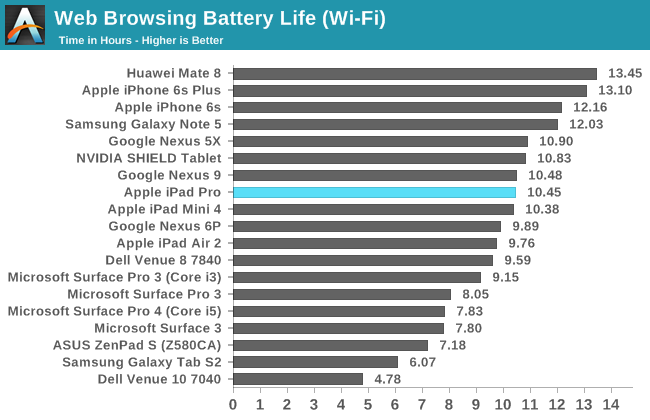
Our first test is the venerable web browsing test, in which we load a selection of web pages from full charge until the device shuts off from lack of battery charge. In WiFi battery life is pretty much identical to the iPad Air 2, which might be surprising given that the battery is only 41% larger. That might sound like a lot, but the display of the iPad Pro is 77% larger at the same 264 PPI pixel density, which means that there’s a pretty sizeable efficiency gap between the iPad Air 2 and iPad Pro. The improved display and SoC are likely to be the main reasons for this, as the 20nm SoC process that was used to make the A8 SoC was quite leaky due to its traditional planar transistor structure compared to the FinFET process used in the A9X.
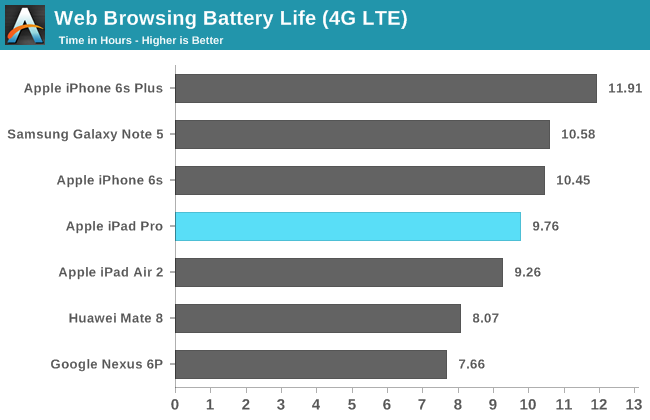
Interestingly, for whatever reason when re-running the same test on LTE battery life is noticeably different when compared to the iPad Air 2, where LTE and WiFi battery life were relatively close. I suspect that RF power is pretty similar between the two devices, but due to efficiency improvements on the display/SoC side the difference in battery life due to additional RF power consumption is magnified.
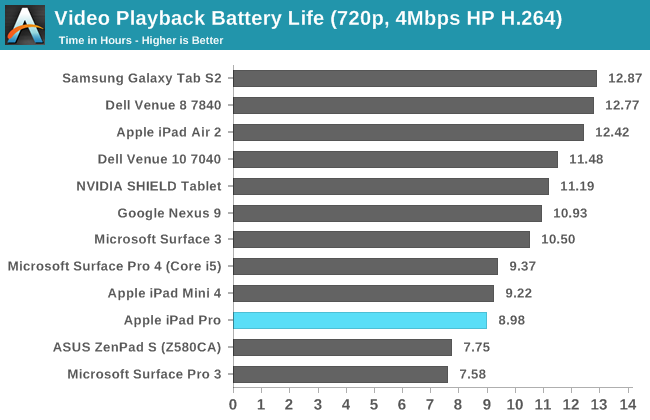
The more interesting test result that I encountered over the course of battery life testing was our tablet video rundown test. For whatever reason, web browsing clearly lasts a decent amount longer. It's pretty unlikely that the web browser has a lower SoC load when video is basically entirely dependent upon fixed function hardware decode. The most plausible explanation here for me is that we're seeing differences that arise from panel self-refresh, which can kick in on our web browsing test while the same definitely doesn't hold for our video test, which basically requires at least 30 FPS refresh rate continuously for the entire duration of the test. Overall that this makes the iPad Pro worse for content consumption, given Apple's content creation goals, is an unexpected turn of events.
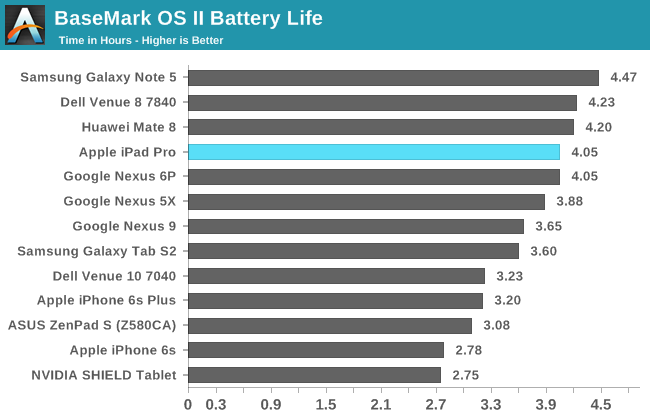
Moving on to the more SoC-bound tasks, we can start by looking at Basemark OS II, which is basically a CPU power virus that can be used to examine the upper bound for device TDP, in addition to nominal sustained CPU load. It’s evident from this test and some back of the envelope calculation that total device TDP excluding display power is roughly 5W, which is about right given the size of the device. This suggests that the A9X can be directly compared to Intel’s Core M in both performance and power, for better or for worse. Performance here is good, with relatively low throttling due to the use of a FinFET process and solid implementation of the Twister architecture.
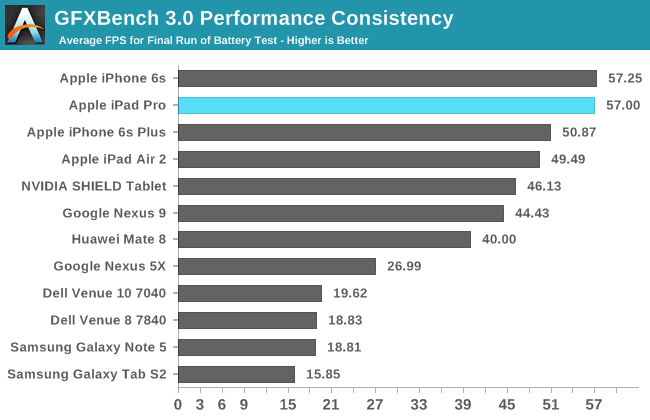
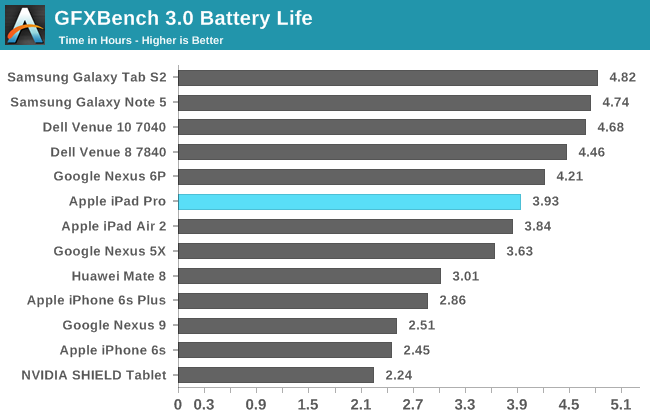
In our GPU throttling test, the A9X has effectively made it impossible to actually use T-Rex as a throttling test as it’s essentially pegged at vsync for the entire duration of the test. The iPad Pro also lasts a similar amount of time here as on the Basemark OS II test, which suggests that this test is still reaching TDP limits for the GPU, even if it doesn't manifest in the form of reduced performance.
Charge Time
While battery life is important, any time you’re dealing with a mobile device the time it takes to charge the battery is important as well. The usual example here is travel, but simply forgetting to plug in a device overnight can show the importance of charge rate. In the case of the iPad Pro, Apple ships it with their usual 12W charger. One might be tempted to suggest that the battery would be charged in about 3.5 hours, but it’s necessary to get the data and avoid speculation on something like this. In order to test how quickly the iPad Pro charges, we measure the difference in time between first plugging in a fully discharged tablet and when the charge is complete based upon power draw at the AC adapter.
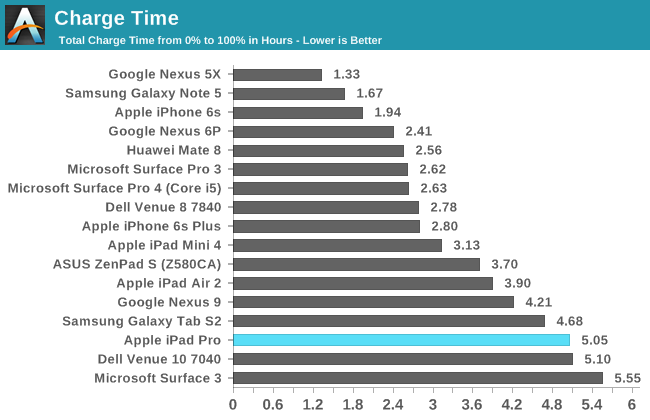
Interestingly, the iPad Pro takes a pretty significant amount of time to charge, at over a full hour longer than the iPad Air 2. While some might be okay with this, it’s definitely a sore spot for the iPad Pro as a higher voltage charger would be able to charge the device at a more acceptable rate. I’m not really sure why Apple decided to go this route, but there’s really no clear solution here unlike the case of the iPhone 6s Plus. The charger also definitely isn’t enough to ensure that you’re always charging the iPad Pro while in use either if the SoC is in overdrive/turbo states as thermally constrained power draw is already around 9-10W.
Despite the long charge time, overall the iPad Pro is quite mobile. However, it does regress somewhat relative to the iPad Air 2 due to its longer charge time, even if battery life is equivalent. Depending upon your use case though it might be difficult, if not impossible to tell the difference.


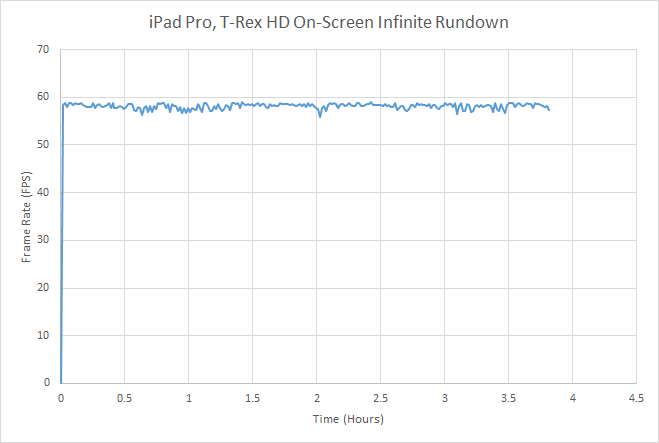








408 Comments
View All Comments
MaxIT - Saturday, February 13, 2016 - link
Reality check: the "nonplussed" product sold more than the well established surface pro in the last quarter.... So maybe you are just expressing YOUR opinion, and not "everyone's "....lilmoe - Friday, January 22, 2016 - link
The performance is "great" for iOS, FTFY. It would suffer on anything "Pro"....ddriver - Friday, January 22, 2016 - link
Performance is better than a high end workstation from 10 years ago, a system which was capable of running professional tasks which are still nowhere to be found on mobile platforms. And it has nothing to do with performance. It has to do with forcing a shift in the market, from devices used by their owners to devices, being used by their makers to exploit their owners commercially. And professional productivity just ain't it. Not content creation but content consumption. People flew in space using kilohertz computers with kilobytes of memory, today we have gigahertz and gigabytes in our pockets, and the best we can do with it is duck face photos. That's what apple did to computing, and other companies are getting on that train as well, seeing how profitable it is to exploit society, it is in nobody's interest to empower it.Phantom_Absolute - Friday, January 22, 2016 - link
I just created an account here to say...well said my friendlilmoe - Friday, January 22, 2016 - link
I was trying really hard to understand what you were trying to say.Computers didn't get us to the moon. They sure helped, a LOT, but it was good ole rockets that did.
Anyway, point is (and I exaggerate), even if you shrink the latest 8 core Xeon E3 coupled with the fastest Nvidia Quattro into a 3-5W envelope and stick in an iPad, it won't make it anything close to a "Pro" product. It's about overall FUNCTION.
An iPad "Pro" with a revamped version of iOS, more standard ports, and a SLOWER SoC would be a much better "Pro" product than what we have here.
Even Android sucks for Pro tablets. Only Microsoft has a thing here.
ddriver - Friday, January 22, 2016 - link
What I am trying to say is mobile hardware IS INDEED capable of running professional workloads. Of course it won't be the bloated contemporary workstation software, but people have ran workstation software on slower machines than that, and it was useful. So yes, this device has enough performance for professional tasks. There is no hardware lacking, only the software is.I can assure you, no matter how many rockets you have, you will never reach the moon absent computer guidance. The rocket is merely power, but without control, power never constructive and always destructive.
lilmoe - Friday, January 22, 2016 - link
"There is no hardware lacking""The rocket is merely power, but without control, power never constructive and always destructive"
You seem convinced that you can be productive on a screen with only a fast SoC attached. I don't know where to start.
With all due respect, your analogies are ridiculously irrelevant (hence why I was having trouble understanding them). Workstations in the past had much more FUNCTION that any iPad today. IT'S NOT ONLY ABOUT THE COMPUTING POWER. These workstations, despite lacking power by today's standards, were built with certain function in mind, and were used for their intended tasks.
iPads are consumption devices, first and foremost. Apple did nothing for "computing", but they did a lot for consumerism. iDevices got popular because they addressed consumption needs by lots of consumers that they didn't even know they needed/wanted, I'll give them that. But Apple's *speed* of forcing "new technology" on people's throats, and turning perfectly functional products unusable is unprecedented, and bad. Your "Pro" device is NO exception, and isn't going to last, nor function, as long as the _workstations from 10 years ago_...
The Pro moniker is being abused. What does it even mean now? Relative speed? Function? Value? Multiple products in one? I don't know anymore. But I'd like to believe that Microsoft's definition of a Pro products sounds easier on my ears.
You seem to be extremely sold on marketed idea that disposable technology with a timed bomb to obsolescence is a good thing. Technology that does nothing but harm the industry and its consumers. To each their own I guess.
ddriver - Friday, January 22, 2016 - link
You are ridiculously ignorant. Both a workstation from 10 years ago and this product are in terms of hardware general purpose computers. What specifies one as a workstation and another as a content consumption device is the software that runs on that general purpose computer. A 10000$ contemporary workstation would only be good for content consumption without the workstation grade software. Much the same way that this device can be good enough for workstation use with the proper software. Once again, clean up your ears - there is no limitation on a hardware level. It is all about the software.Your problem with understanding my analogies stems from the fact you are a narrow minded person, and this is not an insult but a sad fact, most propel are, it is not your fault, it is something done to you, something you are yet to overcome. You are not capable of outside the box thinking, you are conceptually limited to only what is in the box. Why is why you perceive outside the box opinions as alien and hard to understand.
lilmoe - Friday, January 22, 2016 - link
lol, I should really convert to the Apple religion just to stop being ignorant. Take care man.ddriver - Friday, January 22, 2016 - link
You should just sit down and carefully reevaluate your whole life, I mean if "apple religion" is what you were able to take out of all the apple bashing I went through :D Since you obviously missed that obvious thing, let me put it out directly - I am criticizing apple for crippling good hardware to useless toys.